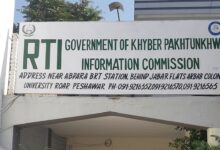Activists Demand Effective Implementation of RTI Laws

ISLAMABAD: Despite having reasonable legislation in all four provinces and federal, citizens are having obstacles in access to information in Pakistan.
Muhammad Naeem – RTI Activist from Mardan – while talking with “The Reporters” said, poor implementation of the Right to Information Laws have made it useless for a common citizen. Some of my complaints are pending before the Khyber Pakhtunkhwa Information Commission (KPIC) from more than two years, which were supposed to be decided in 60 days as per the act.
The Abdul Wali Khan University- Mardan from last two years is reluctant to share the information about the total fee collected from the students for the issuance of student cards and University policy in this regard, Naeem maintained.
He went on to say that the Information Commission closes citizen appeals even when the citizen is provided with incomplete and irrelevant information in order to demonstrate their performance to the civil society organisations.
Performance of KP Information Commission:
Farh Hamid Khan – Chief Information Commissioner, KPIC – while addressing an event held on September 28, 2022 in Peshawar said, information has been provided to 93 percent of the citizen while fine has been imposed on 20 departments for not implementing the order of the KPIC since its establishment to August 2022.
She added, 1446 government and semi government departments have designated Public Information Officers in their department to effectively process the information requests of the citizen.
Farah maintained, two posts of the Information Commissioners are laying vacant since long which are badly affecting the performance of the Commission, moreover, the KPIC also facing the problems of lack of manpower and resources which have been taken up with the provincial government.
It is pertinent to mention that this scribe has filed an information request to KPIC on August 26, 2022 and requested information about the total number of Complaints received from 1st Jan 2020 to 1st August 2022 and number of complaints in which the public bodies has provided information to the complainant during the same time period.
The information shared by the KPIC, in response to the information request filed by this scribe, states that the Commission has 49 sanctioned posts while 43 of them are filed and only 6 of the sanctioned posts are vacant.
Documents furthers states that KPIC has received 628 complaints from Jan 2022 to August 2022, out of which 375 are under process while in 253 complaints the public bodies has provided required information to the citizens.
Experience of RTI Practitioners
When contacted Manzoor Hussain – a broadcast journalist – said, government departments use different tactics for create hurdles in provision of the information to the citizen. Most of time complaints are closed even the information provided by the department is incomplete and irrelevant.
To a question Mazoor added, in response to most of the information requests the department respond that the requested information is exempted from disclosure under the Right to Information Act, in such cases the citizen has to contest his case with support of legal sections of the laws in the Information Commission, which is not an easy job for a common citizen.
“I have received only 50 percent information in response to my information requests filed to different provincial departments, the quorum of the information Commissioners is also incomplete from last six months due to which thousands of the complaints are pending in the Commission”, he maintained.
Response of Punjab Information Commission
The documents received from Punjab Information Commission (PIC) in response to an information request filed by this Scribe shows that 60 percent of the sanctioned posts in PIC are vacant. Documents states that PIC has 34 sanctioned posts while 20 of them are vacant. The Commission is currently performing his duties with a man power of 14 persons including supporting staff like office boys as well.
In response to a question “In how many complaints the citizen has received information”, PIC stated, “This question certainly involves scrutiny of all files to make a response in 2+2 which is not possible with the limited number of staff. Such exercise can be made only by suspending the regular work of the Commission. However, the Commission can safely declare that in about 90 percent of cases the requisite information was disclosed whereas 10 percent of the cases comprised where claims of exemption were accepted or information could not be disclosed for some other reason as well.”
Journalists’ RTI and Bureaucratic Responses:
When contacted, Shehzad Yousafzai – journalist and recipient of RTI Champion Award – said, it is a fact that implementation of the right to information laws is a challenge in Pakistan, citizen has to wait for many months to get information and in some cases even after a long wait the citizen do not get relevant and complete information.
To a question Yousafzai said, government officers or bureaucrats have a typical mind set and that is to hide information from the citizens. “When I asked the Prime Minister Office to provide the flight details of the helicopter being used by the then Prime Minister Imran Khan, they responded that it is defence matter, therefore the information can’t be provided. Even the Information Commission held that this information is not a secret record it should be provided to the citizen but the PM Office has not provided that information to date”, he maintained.
Similarly, in another case, one of our friend asked for the list of the bureaucrats who are not submitting their assets declaration to the Establishment Division, as required under the law, the Establishment Division has refused to share the information and claimed that this information will effect the personal privacy of the bureaucrats.
He added, the citizen particularly journalists should keep practicing these laws and should ask questions not only from the government departments but also from the Information Commission to make them accountable.
Pakistan Information Commission:
The information provided by the Pakistan Information Commission (PkIC), in response to an information request of this scribe, shows that only 45 percent of the citizen has received the information from different public bodies after approaching the Information Commission.
Statistics shows that PkIC has received 2570 appeals since its establishment in November 2018 to date, out of which 1106 are in process at different stages while that Commission has passed detailed orders on 637 appeals.
RTI Success Stories:
Nadeem Umer – recipient of RTI Champion Award in citizen category – said, the Information Commissions are having the power of civil court, but unfortunately, they do not practice these powers and always have soft corner for the government department which is destroying the importance of these laws.
When asked about the success stories of these laws, he said, a citizen namely Naeem Sadiq of Karachi is using these for the implementation of the minimum wage to the janitorial staff and security guards working with different government departments.
Nadeem said, “few days ago a common man of our village came to me a complaint that Peshawar Electric Supply Company has fined him of 35 thousand rupees for allegedly tempering his electricity meter, he was saying that he has not done any tempering. I have written an information request for him and requested the lab report and other record which proves any tempering in the electricity meter if he has done.
When we filed complaint in the Information Commission, the concern office not only waved off the fine but also restored his electricity connection.”
He maintained, right to information laws are knows as key to all rights, but the poor implementation is destroying its significance.
Sindh Information Commission:
Shahid Jatoi – Information Commissioner, Sindh Information Commission (SIC) – said, the SIC has received 270 complaints so far. SIC has issued notices on all these complaints.
He added, an order on a complaint and summons to two secretaries of provincial departments are also issued recently in pursuance of the complaints.
Jatoi informed that SIC is facing problems due to lack of resources including financial and manpower. These issues were discussed with Provincial Government who have approved grant for SIC which will be released soon, moreover, Chief Secretary Sindh has also provided some staff on deputation bases to SIC which will join soon.
He maintained, it is a fact that citizen has faced problems due to lack of the implementation of this act in the past, however, soon citizen will start getting response to their information requests.
Background of RTI Laws in Pakistan:
Pakistan was the first South Asian country to enact the Freedom of Information Ordinance (FOI) in 2002. However, under the miliary regime, this ordinance was kept weak and ineffective in terms of ensuring free flow of information. 2010, was a turning point for democracy when the provinces were granted autonomy under the 18th amendment in the constitution of Pakistan, and the citizens were granted the fundamental right of access to information through the insertion of Article 19-A, which states “Every citizen shall have the right to have access to information in all matters of public importance subject to regulation and reasonable restrictions imposed by law”.
Year 2013 was a progressive year in terms of the development of Right to Information movement in Pakistan. Khyber Pakhtunkhwa and Punjab enacted effective Right to Information laws, namely “The Khyber Pakhtunkhwa Right to Information Act, 2013” and “The Punjab Transparency and Right to Information Act, 2013” respectively. These laws are helping citizens in exercising their constitutional right of access to information held by public bodies. Sindh has also joined Punjab and Khyber Pakhtunkhwa by enacting “Sindh Transparency and Right to Information Act, 2016” enacted on March 13, 2017. The federal government also repealed the weak FOI 2002 ordinance with an effective “The Right of Access to Information Act in 2017”. And finally, Balochistan province also repealed its ineffective “Balochistan Freedom of Information Act, 2005” and replaced it with “the Balochistan Right to Information Act, 2021” in February 2021.
Importance of the RTI Laws:
The Right to information is also known as “Key to all rights”. These laws give right to the citizen to acquire information or documents from any government department but with some reasonable restrictions. The government departments are bound to provide the requested information / documents to the citizen within 10 working days of the receipt of his/her information request.
These laws also bound the public bodies to facilitate the citizen in writing the information request if he/she don’t know how to write an effective information request.
To ensure the implementation of these laws, the federal and provincial governments except Government of Balochistan has established Information Commission in the provincial and federal capitals.






